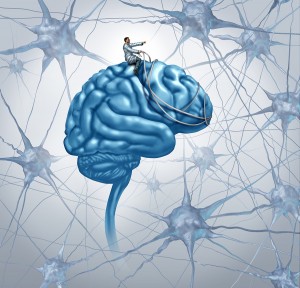 The hormonal structure of the body, whether it’s in balance or out of balance, plays a huge role in dictating how you feel and function, especially for people ages 30 and older. That’s because hormones have a significant impact on brain function.
The hormonal structure of the body, whether it’s in balance or out of balance, plays a huge role in dictating how you feel and function, especially for people ages 30 and older. That’s because hormones have a significant impact on brain function.
Let’s be clear about one thing right off the bat. Hormones aren’t just a female thing. Hormones are essential for health and vitality in both women and men. When hormones are balanced, we tend to feel very happy and energetic.
In a previous post about maintaining your brain, I talked about brain chemicals like dopamine and gaba, and how the neurotransmitters of the brain are wired. Hormones have an impact on the wiring and structure of those neurotransmitters.
As Dr. Daniel Amen explains in his book, Change Your Brain, Change Your Body, hormones are like chemical messengers that travel through the blood stream and make it possible for the brain to communicate with other organs.
How important are hormones? Well, Dr. Amen puts it this way – change your hormones, change your brain, change your body, change your relationships. When your hormones are off, everything in your life suffers.
For example, let’s say you have low thyroid hormone, or hypothyroidism. Low thyroid is associated with overall decreased brain activity. It makes us feel depressed and irritable. We have trouble thinking clearly.
Likewise, low testosterone levels have been associated with low libido, depression, memory problems. Again, hormones aren’t just a female thing. Men and women both have testosterone and estrogen. Men just have a lot more testosterone and women have a lot more estrogen.
The balance of these two hormones has a direct impact on how we feel and function.
Most people think their hormone-producing glands are the sole source of their hormonal problems. In reality, all of these glands, from the thyroid to the liver to the ovaries, are controlled by the brain.
Think of the brain as the conductor of the orchestra. The hormone-producing glands are the members of the orchestra – the violinists, the cellists, the trumpeters and others.
The glands don’t communicate with each other. Individually, they communicate with the brain. As blood filters through the brain, the brain can tell if there’s a shortage or overage in the various hormones and orders hormone-producing glands to adjust their production levels accordingly.
Just like a conductor brings together the musicians of an orchestra to make beautiful music, the brain balances our hormones to help us feel and function better. But if one musician misses a note, it disrupts the performance.
In the next post, I’ll discuss the hormonal cascade, the role of cholesterol in hormone production, and why the thyroid hormone in particular is so important to proper brain function and our overall health.
 Dr. James Proodian is an accomplished chiropractic physician and health educator who founded Proodian Healthcare Family of Companies to help people feel better, function better, and live longer. His expertise for the past two decades has been in physical rehabilitation, and he has successfully established himself as a spinal specialist. In his practice, he advocates the science of functional medicine, which takes an integrative approach to treating patients by addressing their physical, nutritional, and psychological needs. Alarmed by the escalation of complex, chronic illness in our country, Dr. Proodian has been speaking to companies and organizations through his “Wellness at Work” program since 1994, motivating thousands of people to make positive lifestyle choices and lead healthier, more productive lives. He can be heard weekly on his radio program, “Proodian Healthcare By Design,” on Tandem Radio.
Dr. James Proodian is an accomplished chiropractic physician and health educator who founded Proodian Healthcare Family of Companies to help people feel better, function better, and live longer. His expertise for the past two decades has been in physical rehabilitation, and he has successfully established himself as a spinal specialist. In his practice, he advocates the science of functional medicine, which takes an integrative approach to treating patients by addressing their physical, nutritional, and psychological needs. Alarmed by the escalation of complex, chronic illness in our country, Dr. Proodian has been speaking to companies and organizations through his “Wellness at Work” program since 1994, motivating thousands of people to make positive lifestyle choices and lead healthier, more productive lives. He can be heard weekly on his radio program, “Proodian Healthcare By Design,” on Tandem Radio.